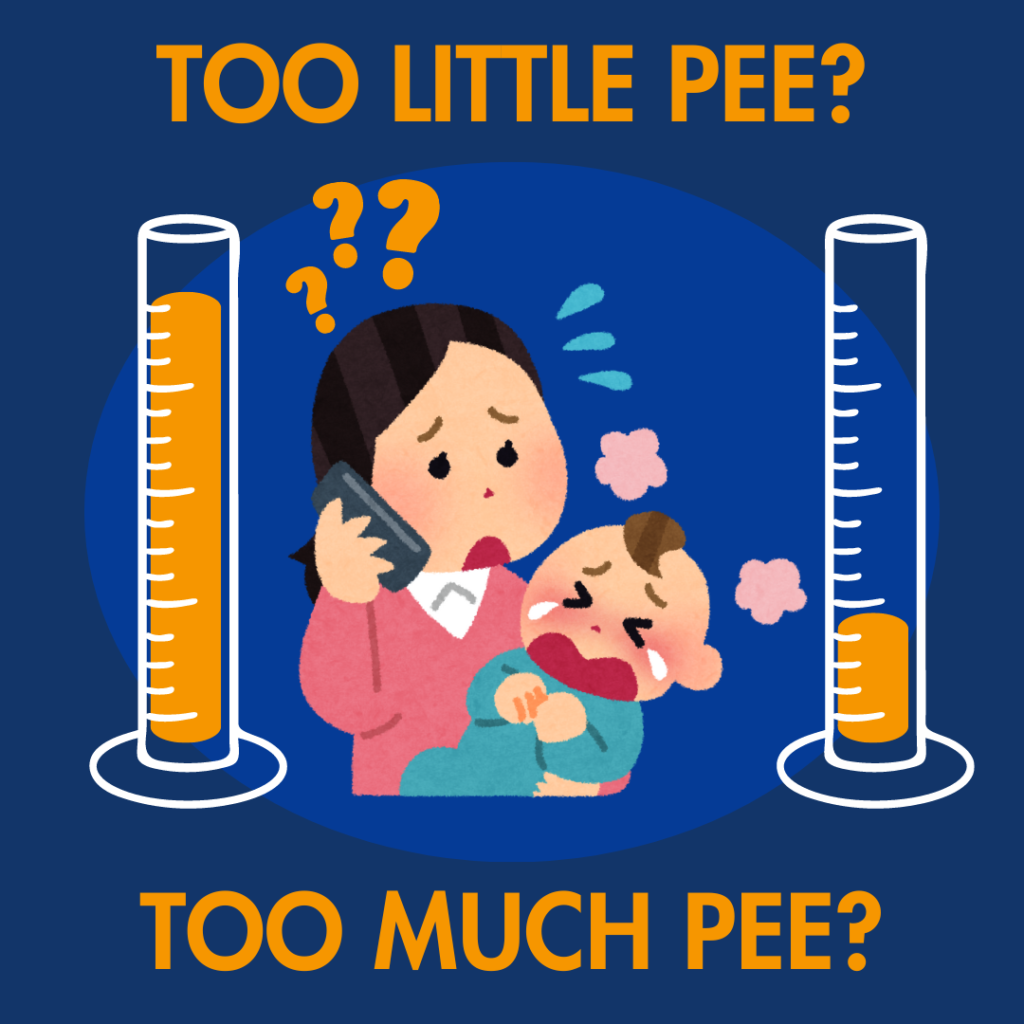Is my baby peeing too little or too much?
Excess, lack or limited peeing can be signs of a disease.There are many diseases both rare and common that cause your baby to pee irregularly. As parents, we know best when there’s something wrong with our baby. We need to have the tools to advocate for our babies to our healthcare providers. To do this, we’ve listed some major reasons for too little or too much pee.
EXCESS URINATION
There’s two types of excess urination. Polyuria means both more frequent urination, and higher volumes of urine. Pollakiuria, or frequent daytime urination, means an overactive bladder, usually caused by behavioural issues in children. Let’s look at what to expect and what to be vigilant for.
Normal functioning:-
Newborns pee very frequently. Their bodies are entirely focused on digesting nutrients to grow quickly as possible, and so their bladders must keep up. They can easily go through 4 to 6 diapers a day. Older infants start pushing the limit of their bodies by holding pee for too long or not fully emptying their bladder. This is typically a behaviour issue and will resolve through regular parenting.
Infections:-
There are always other signs of discomfort in the case of a disease. A UTI can cause increased urination, and you’ll see a cloudy texture in your baby’s pee, as well as screaming or discomfort while peeing. Infants may hold urine longer to avoid this discomfort, leading to further complications.
Common genetic disorders:-
Type I Diabetes (Diabetes insipidus) can also cause frequent urination from birth. However, this is a genetic disorder and can only be inherited, unlike Type II Diabetes which typically develops later in life. If your family has a history of diabetes, it’s possible your child has inherited it too.
Rare genetic disorders:-
The rarest reason is Urofacial Syndrome, a neuromuscular disorder that makes the baby’s muscles work in the opposite direction. For example, if the baby tries to smile, they grimace instead. If they try to close their bladder, it opens instead. It’s a genetic disorder that requires therapy from birth to resolve. The sooner it can be diagnosed, the better.
LIMITED URINATION
Oliguria is a lack of urination in babies. Small babies should pee the same number of millilitres as they weigh in kilograms every hour. For example, a 3kg baby should pee 3 millilitres every hour or 72 millilitres a day. Normally they pee more than this, but this is the bare minimum. Any less means there’s a problem. Let’s look at a few causes:
Behavioural issues:
The most common reason for reduced urination is a behavioural issue. Older infants will hold their pee to stay glued to the TV or play with their toys longer. This is a bad habit and can lead to UTIs or bladder muscle problems in time.
Dehydration:
Another reason may be dehydration. This is more common in older infants who are eating solid food and drinking water. If your babies are breastfeeding regularly but still show signs of dehydration, there may be issues with nutrient-uptake in their body, or they may be losing moisture and nutrients due to a tumour or internal blisters. If your baby appears dehydrated for no obvious reason, contact your doctor immediately. Older infants may need more encouragement to drink water, which can feel like a chore. Buying a toy sippy cup could make it enjoyable.
Infections:
As mentioned before, a UTI can cause discomfort when peeing, leading your baby to avoid urination. A kidney or urinary tract blockage could also be the cause, as urinary crystals form easily at this age.
UTIs are the most frequent diagnosis for bladder problems, especially in girls. This can cause healthcare workers to overlook other significant symptoms, leaving parents feeling ignored and worried. This is especially a concern when the signs point to neurological disorders.
Rare Genetic problems:
Hinman Syndrome (HS) is a rare paediatric bladder dysfunction disorder that appears to be brain-related in nature but has no obvious physical symptoms. This disorder is often mistaken for UTIs or normal bed wetting. The involuntary nervous system sometimes sends the wrong signals to the bladder, causing it to relax and urinate. This can happen during the daytime too (unlike bedwetting) and can be very embarrassing and uncomfortable for your baby, though not painful like UTIs. Therapy and medication from a young age can help restore control, which is why it is important to recognise the symptoms and differentiate between diseases.
How do I detect these diseases early?
Contact your doctor, and us!
Most of these diseases can be diagnosed at birth through Newborn Screening (NBS). The doctor will take a spot of blood from your infant’s heel on blotting paper and send it fortesting to identify genetic abnormalities. If your newborn was not screened, look for the nearest centre that provides this service, or recommend our NBS services to your doctor!
We are doing our best to bring Newborn Screening and other neonatal technology to hospitals around India, starting with the Delhi-NCR area. If your paediatrician does not have access to the tools needed to check for rare diseases in your infant, put them in touch with us. It’s our mission, and we are glad to help.
Now that you know what signs to look out for, you can advocate for your baby the way they need you to. Let us know if this helped or if you have any questions!
Put your thoughts in the comments below!



